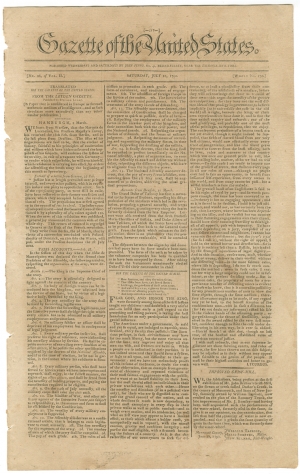|
Franklin on Revealed Religion, and South Carolina on Freedom of Religion |
Click to enlarge:

Select an image:
[BENJAMIN FRANKLIN].
Newspaper. Gazette of the United States, July 10, 1790, New York, N.Y., 4 pp. (pp. 517-20), 10½ x 17 in.
Inventory #30022.11
Price: $750
Among other content this issue includes an amusing anecdote regarding Franklin and religion (p4/c3).
Excerpt “Anecdote of Dr. Franklin”
“A GENTLEMAN remarkable for his aversion to revealed religion, some time ago, in a large company, among whom was Dr. Franklin, indulged himself in a number of remarks dishonorable to the Christian faith, and warmly opposed all who defended it: when, turning to the Doctor, he appealed to him for the truth of his assertions. That good old man made this laconic wise reply: “IT IS SAFEST TO BELIEVE.” This declaration, considered as the mature decision of one of the most enlightened sages, after upwards of fourscore years experience in the learned and active world, is of no little weight in the scale of human opinion, on the most important question in the universe.”
Also includes the rest of the new Constitution of the State of South Carolina, articles VIII-XI, including protection for freedom of religion (p4/c1).
Excerpt of Constitution of South Carolina
“ARTICLE VIII.
“Sect. 1. The free exercise and enjoyment of religious profession and worship, without discrimination or preference, shall, forever hereafter, be allowed within this state to all mankind; provided that the liberty of conscience hereby declared shall not be so construed as to excuse acts of licentiousness, or justify practices, inconsistent with the peace and safety of this state.
“Sect. 2. The rights, privileges, immunities and estates of both civil and religious societies and of corporate bodies shall remain as if the constitution of this state had not been altered or amended.”
This issue includes two acts of Congress, including one authorizing President George Washington to purchase for the use of the United States, “the whole or such part of that tract of land situate in the state of New York, commonly called West-Point, as shall be by him judged requisite for the purpose of such fortifications and garrisons as may be necessary for the defence of the same.” After Steven Moore sent Congress a bill for damages to his property caused by its occupation by the United States army since 1778, Congress forwarded it to Secretary of the Treasury Alexander Hamilton. Hamilton believed that purchasing the land was “expedient and necessary,” and Congress agreed. A commission appraised the land owned by Moore, and on November 22, 1790, the government paid him $6,576 for the property.
This issue also includes translated excerpts from the French Gazette of Leiden, bringing the latest news from Europe (p1/c1-2), minutes from the U.S. House of Representatives (p3/c1-3), and a brief description of the celebration of independence in Philadelphia (p3/c3)
The Gazette of the United States is often considered the most significant political newspaper of the late 18th century.The Gazette was established as a pro-Federalist voice in New York City in 1789 by John Fenno, and followed the government to its temporary capital in Philadelphia in 1790. Early Acts of Congress and Presidential Proclamations were often first printed in this newspaper.